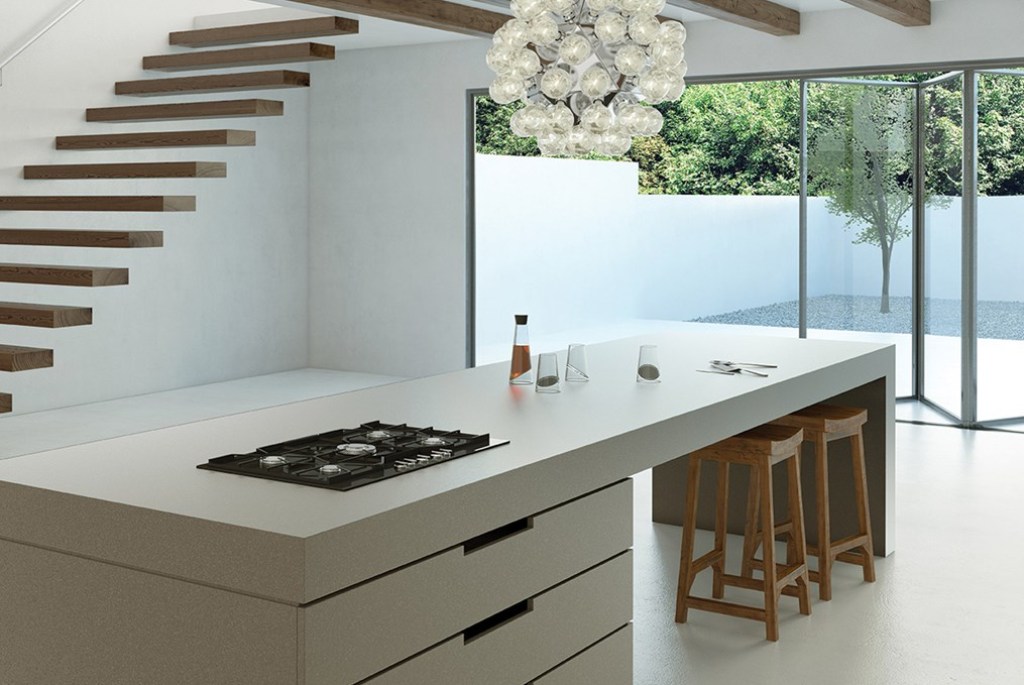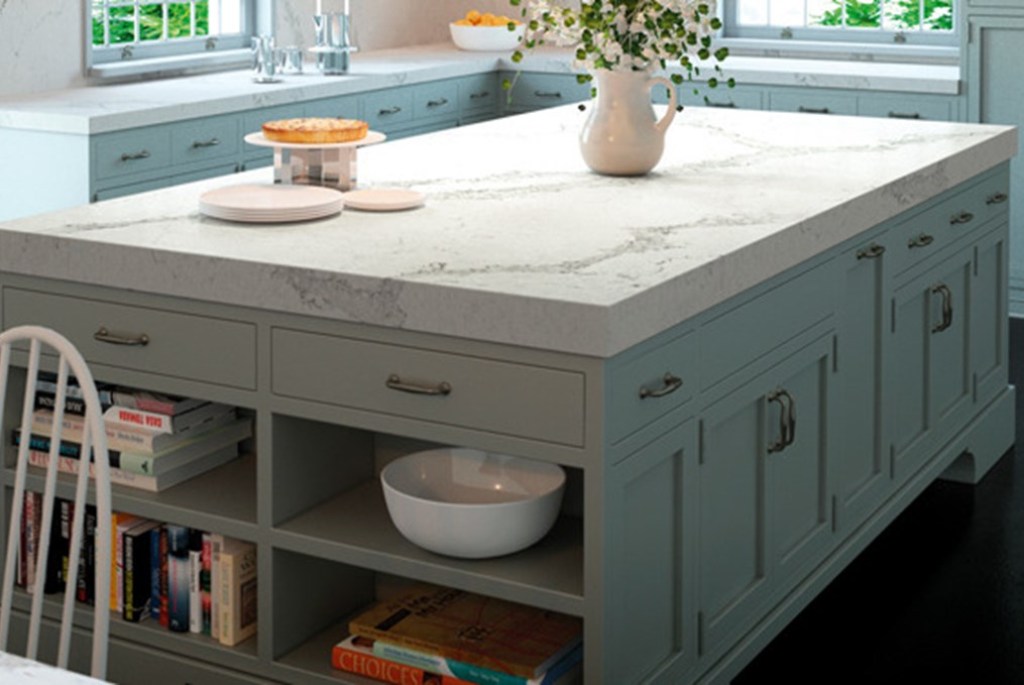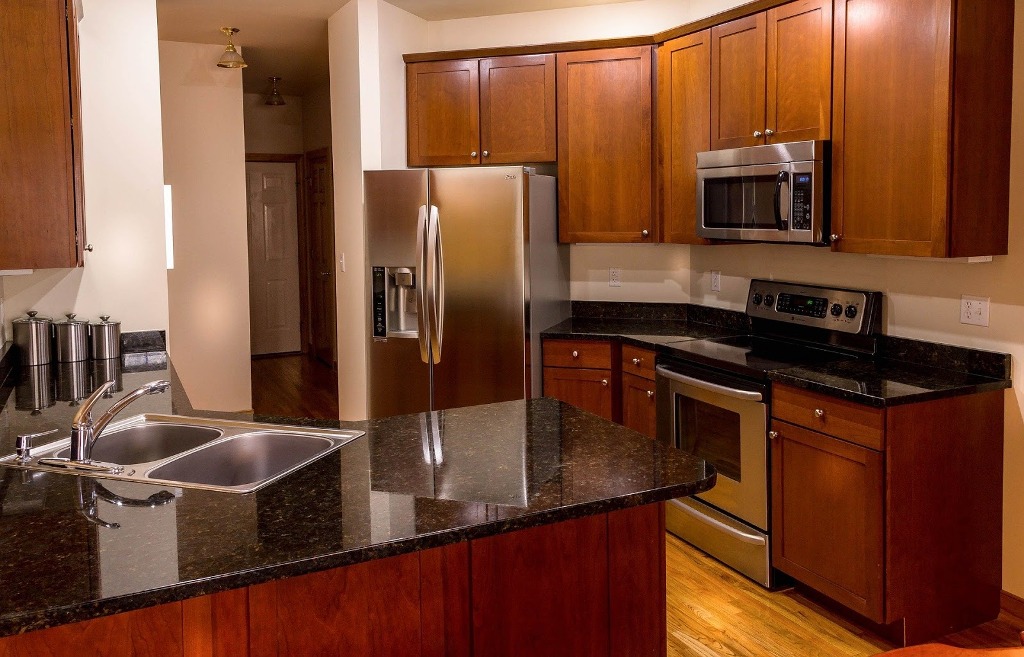Positive: Granite is Heat-Resistant
Granite is a very heat-resistant material; it is virtually impossible to scorch countertops made from it unless you try, which means taking a blowtorch to them.
As such, any consideration of granite countertop pros and cons will list this among the chief benefits.
Negative: Heat Will Still Damage the Seal on Granite Countertops
While granite itself won’t be damaged by heat, the materials that are used to seal the porous rock are not heat-resistant. This sealant will wear away when exposed to heat, exposing granite to its weakness: spills. More on this shortly.
Positive: Granite is Very Scratch-Resistant
When considering the granite kitchen countertops pros and cons, scratch resistance is another one that’s oft-mentioned alongside their resistance to damage from extreme temperatures.
Granite’s hardness means you won’t scratch countertops made from it with a knife, even if you cut directly on the surface. On the contrary, it will dull your knife!
Negative: Granite is Porous and will Stain with Ease
Maintaining a proper seal on granite countertops is essential. Because the rock is porous, it will soak up spills and with ease when the sealant wears down and the rock is even slightly exposed.
Heat isn’t the only thing that wears the sealant down, either. Normal day-to-day use eats away at the seal enough to require its replacement at least once every year. When it comes to the pros and cons to granite countertops, this is one of the biggest concerns in the latter category as it can lead to major expenses and headache.
Positive: Granite Countertops Are Beautiful
Granite countertops were popular in decades-past for a reason. There’s no denying that they offer an interesting aesthetic. However, as we’ll explore shortly, this aesthetic isn’t uncontested like it used to be. There are now modern materials that give granite a run for its money not only in terms of aesthetics but function as well.
Negative: Granite Countertops Are Going Out of Style
Rounding off this list of granite countertops pros and cons, we have the fact that they’re no longer as desirable as they once were. While they’ve always been a premium product, even those with untethered budgets can’t deny that their dollars are better spent on modern materials that create a more distinctive look while offering improved reliability.
As such, granite has taken a nosedive in popularity and will no longer flatter potential future buyers of your home like it once could.
The Ultimate Alternative to Granite Countertops: Quartz

After weighing the pros and cons to granite countertops, you may be wondering what’s taken its place as the most popular premium countertop material out there.
The answer? Engineered stone, also known as quartz.
While granite and quartz exist in the same general ballpark as far as upfront costs go, quartz pulls away significantly over the long haul.
Click learn more to discover a head-to-head comparison of granite and quartz. We’ll summarize the matchup below.
Quartz is More Durable Overall
Quartz and granite offer comparable levels of heat resistance. However, quartz countertops are not porous and the sealant will not wear away with everyday use. These two characteristics mean that, unlike granite countertops, quartz will not stain or require annual resealing.
Quartz Offers A Greater Array of Visual Options
Granite offers a very limited range of appearances. It comes in different shades, but that’s about it. Beyond color, granite is also impractical for custom designs that involve unconventional countertop shapes; because it’s a natural rock, the shapes it takes on are limited to what can be cut from the raw materials. You can glue pieces together to create unique shapes but that will reveal seams and is generally not something people do.
Quartz, on the other hand, combines natural loose rocks with engineered resins. They get their shape not from creative cuts made to natural rock formations but rather a mold. This opens a world of possibilities concerning shapes; it’s not uncommon to see entire kitchen islands made from quartz.
And then there are quartz color and pattern options.
Quartz’s engineered nature has allowed many brilliant designers to get creative and create countertops that resemble other materials on a granular level. That includes marble, concrete — and even granite.

Pros and Cons to Granite Countertops: Conclusion
After reviewing these pros and cons to granite countertops, you should have a solid idea as to why they are waning in popularity, and why quartz has taken the lead.
To recap, while granite offers an interesting aesthetic and is resistant to heat and scratches, its porous nature and need for constant resealing are two major factors that have contributed to its decline in desirability.
In lieu of granite countertops, many homeowners seeking a premium countertop material have turned to quartz, which offers aesthetics rivalling that of granite while also offering lesser maintenance requirements and greater resistance to staining.

